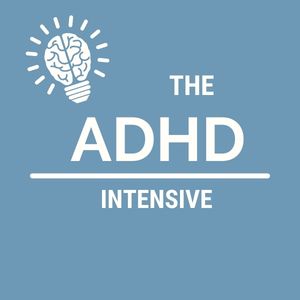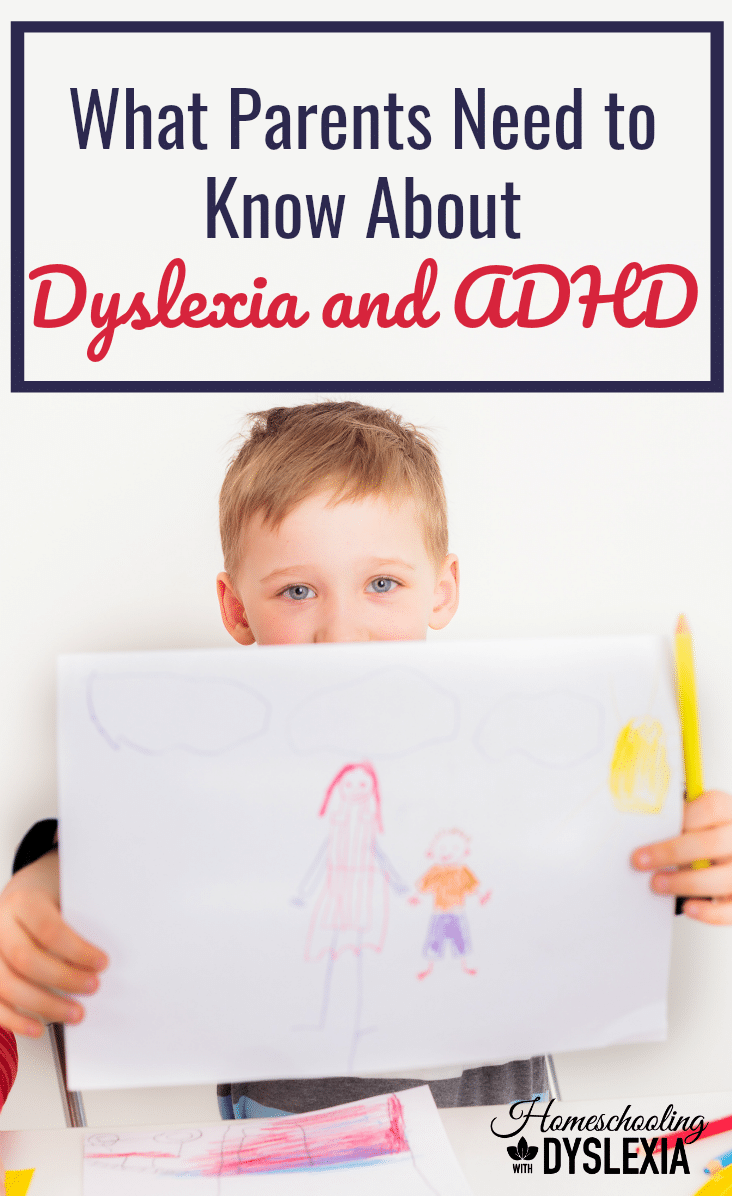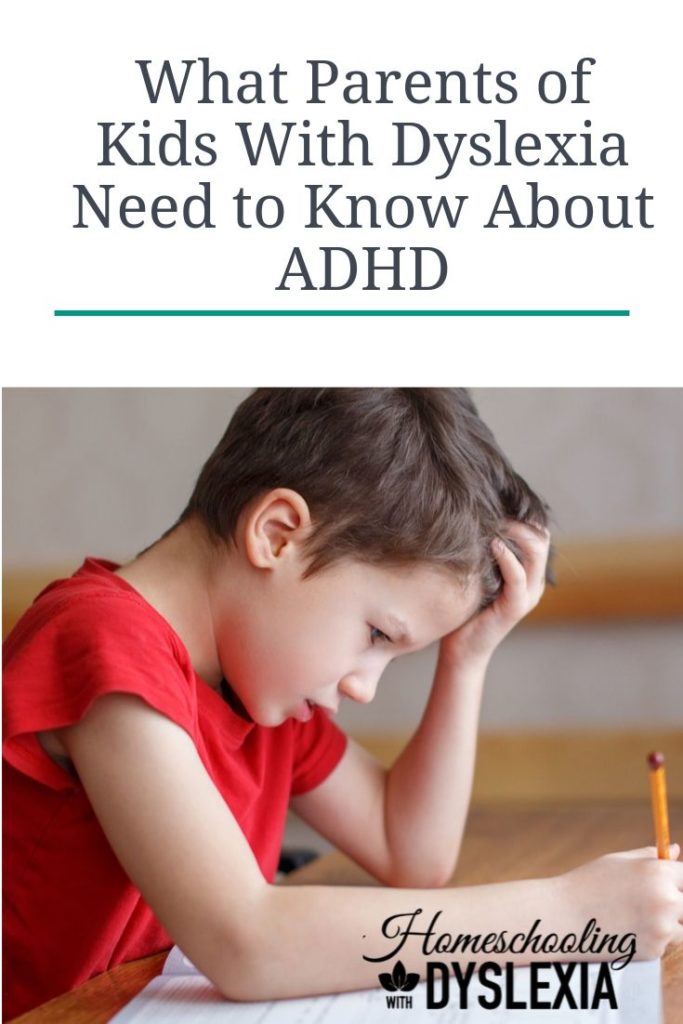Most people are unaware of the connection between dyslexia and ADHD. This article will look at what parents need to know about the connection between dyslexia and ADHD.
The Centers for Disease Control and Prevention (CDC) estimates that almost 50 percent of children diagnosed with ADHD also have another learning ‘disorder’ such as dyslexia. (Read why I don’t consider dyslexia a disorder here.)
The International Dyslexia Association estimates that 30% of those diagnosed with dyslexia have ADHD as well.
The implications of this are huge. ADHD makes learning, especially in the traditional classroom, extremely difficult.
For 20 years, I had no idea that some of my kids were not only struggling with dyslexia but also silently suffering from an agonizing inability to focus – even when they desperately wanted to.
Because of the many myths I believed about ADHD, I overlooked an issue that has resulted in some serious consequences in my kids’ lives. I don’t want that to happen to your family.
This post will share the things I wish I had known when my older kids were still young.
Myths About ADHD
Just as with dyslexia, there are a lot of myths about ADHD that stem from a lack of knowledge of the underlying causes of inattention. Here are some of the most common myths about ADHD.
Myth 1: All kids with ADHD are hyperactive
Fact: Some children with ADHD are hyperactive, but many others with attention problems are not. Children with ADHD who are inattentive, but not overly active, may appear to be spacey and unmotivated. This kind of attention issue is easily overlooked. I talk more about the different types of ADHD below.
Myth 2: Kids with ADHD can never pay attention
Fact: Children with ADHD are often able to concentrate on activities they enjoy. But no matter how hard they try, they have trouble maintaining focus when the task at hand is boring or repetitive. Parents may observe their child spending large amounts of time focusing on building with Legos, playing creatively, playing video games, or while being read to and wrongly assume that they don’t have attention issues.
Myth 3: Kids with ADHD could pay attention if they wanted to
Fact: Children with ADHD may do their best to please their teachers and even strongly desire to do so, but still be unable to sit still, stay quiet, or pay attention. They may appear disobedient, but they are not acting out on purpose. I’ll never forget hearing Jonathan Mooney speak at an International Dyslexia Association conference about his torturous experience with ADHD in the classroom. “When did sitting still become a moral issue?” Myths about ADHD hurt kids. This myth is difficult to accept if you have not personally experienced ADHD.
Myth 4: Kids will grow out of ADHD
Fact: ADHD often continues into adulthood, so waiting for your child to outgrow the problem isn’t a viable option. Treatment can help your child learn to manage and minimize the symptoms.
Myth 5: Medication is the best treatment option for ADHD
Fact: Medication is often prescribed for attention deficit disorder, but it might not be the best option for your child. Effective treatment for ADHD also includes education, behavior therapy, support at home and school, exercise, and proper nutrition.
As with the many myths that surround dyslexia, the myths that surround attention issues such as ADHD can cause a lot of wasted time, misunderstandings, and anxiety.
Types of ADHD
The DSM-V identifies 3 types of ADHD:
- ADHD predominantly inattentive type is characterized by distractibility and difficulty sustaining mental effort and attention.
- ADHD predominantly hyperactive-impulsive type is characterized by fidgeting with hands and feet, squirming in one’s chair, acting as if driven by a motor, and interrupting and intruding upon others.
- ADHD combined type has both sets of inattention and hyperactive/impulsive criteria.
Signs of ADHD
Inattention
- doesn’t pay attention to details
- makes careless mistakes
- trouble staying focused; is easily distracted
- appears not to listen
- difficulty remembering things and following directions
- trouble staying organized, planning ahead, and finishing projects
- gets bored with a task before it’s completed
- frequently loses or misplaces schoolwork, books, toys or other items
Hyperactive
- constantly fidgets and squirms
- runs or climbs inappropriately
- talks too much
- difficulty playing quietly or relaxing
- always on the go – as if driven by a motor
- may have a quick temper
Impulsive
- acts without thinking
- blurts out words without hearing the whole question
- trouble waiting for a turn
- often interrupts
- trouble keeping strong emotions in check – angry or emotional outbursts
- guesses rather than taking time to solve a problem
The Impact of ADHD and Dyslexia on Learning
Just as it is important for parents to understand what it means to be dyslexic, it is also important for them to understand the impact of attention issues such as ADHD on learning. Homeschooling a child who struggles to focus on schoolwork or who has trouble following directions or acts impulsively can be frustrating, especially if you mistakenly believe that the child is acting out willfully.
Understanding and expectations
When parents and teachers understand that a child may desire to sit still and follow directions but be unable to can make a huge difference in their day-to-day relationship with kids with ADHD.
Understanding ADHD can make the difference between daily life becoming a battle of wills or power struggle and becoming one of training and making modifications to the class environment and teaching methods.
ADHD Resources

To learn more about the underlying causes of ADHD and how to help your child with the learning, social, and emotional struggles that come with ADHD, take The ADHD Intensive course. Learn more here.
Our resources page has been updated with some of the top sites to learn more about ADHD, its causes, research, and possible treatments.
As with dyslexia, getting educated about ADHD is critical to understanding and educating your children.









I’m pretty sure my middle son, who is dyslexic, may also be ADD or ADHD. Can you tell me the best way to get him tested? I do NOT want him on medication. We’ve already seen positive results with simple adjustments to his food. But I’m still struggling with simply knowing how to manage his dyslexia so that he doesn’t think poorly of himself. Any advice you can offer would be greatly appreciated.
I’m not sure if you have gotten your son tested or not for ADHD/ADD. However, I was diagnosed with dyslexia when I was really young. But, I didn’t know I had ADD until I was 25 years old.
For me, I was thankful for the medication and saw how it blocked/filtered out all the extra noises, movements, lights, etc. It changed how I studied in university too.
First off, if your son is in public school you can have a counselor ask like a 50 question questionnaire. Let him be honest and you too. If he is not in public school, go to a psychologist.
As for the negative self-image. This will take while to get over. Keep on reminding him that you love him.
Thank you so much Jami!
I have ADD and dyslexia and the thing that helped me when I was younger was hearing about all the smart people like Einstein had dyslexia. People with dyslexia are ALL super smart! We process things differently but that doesn’t make us dumb or lazy!
There is one area that seems to be often overlooked in addressing homeschooling children with needs like dyslexia or ADHD (or in our case both). That is addressing the home that has children with dyslexia and or ADHD with a teaching parent that ALSO has ADHD (or dyslexia or both). Perhaps I am nervous because my executive functioning skills and confidence are sometimes lacking. And this is a new endeavor for me and I know nothing of dyslexia as of now (but I am about to purchase your entire library of courses so I can arm myself with knowledge). Can you help parents like me by giving us some information or at least a confidence boost? Thanks in advance!
This is a great point Jennie! On the one hand staying organized can be hard but on the other, homeschooling parents with ADHD and dyslexia also have an innate sense of how heir kids learn. I’ll look in o having more info on this!
I would appreciate this also. I will have to look through your other posts to see if you have addressed this topic.
This is the mentoring I am needing too. My 15 and 13 year old were just diagnosed dyslexic and dysgraphic (though it is called something else now) and my 15 year old was also diagnosed ADHD. As I worked through the process of assessing them I realized that I am also Dyslexic and ADHD also. (My 15 year old is basically a carbon copy of me.) I am feeling overwhelmed and uncertain. I don’t have confidence in my ability to home educate them…. I want them to have what they need, and I feel like I am staring at a blank wall. I which there were someone I could talk with who would help me along on this journey…. I feel alone and unequipped – under-equipped even, considering my own ADHD issues… Has anyone walked this way before and succeeded?
Hi Heidi. I strongly encourage you to join our Beyond the Box Learning membership site. It is a small, private community of moms who are homeschooling their kids with learning differences. We have an expert talk and a success story each month followed by a live video Q & A with me and the group. In October, our success story was a mom with dyslexia who homeschools her own kids with dyslexia. She has been an inspiration to me for years! Here’s the link to check it out:
https://dev.homeschoolingwithdyslexia.com/beyond-the-box-learning/
I think it would be just the kind of ongoing support you need.
YES!! I am a parent w/ undiagnosed ADHD and Dyslexia. Recently learning about the dyslexia for myself
and my almost 7 yr old daughter.
As I Thought dyslexia was just seeing Letters backwards and whatnot. I
Have taken my two youngest out of school. 5 yr old after only 2 weeks of school starting. She has separation
Anxiety. And Monday was the last
Day for my 7 yr old as she seems to
Be going in reverse with her reading.
And her teacher seemed unwilling
To be patient or understanding with my daughters difficulties. I’ve never done anything like this. Dropped out of school myself in the 9th grade at 16 yr old bcuz no matter how hard I
Tried I barely made Ds. No idea
What I was doing wrong. I only want
What’s best for my kids. I just wish I had the answers to help myself so
I can help them.
My son used Chrome bix2, Orcam, and learning Ally for text and reading books. This article right here. He can’t stay focused on occasion and has to have these, not always but sometimes. He will try to read first. It has progressed to an eye hurting so we have a developmental opthamologist apt. Wearing blue light glasses. We will see what he says. He can read but when it’s read to him, he can ace a test. It causes huge headaches to read really long chapters.
I homeschool my children. My youngest I feel sure is dyslexic and possibly adhd. Any advice for us ?
Learn as much as you can about dyslexia and use the freedom you have with homeschooling to teach him/her how they learn.
What do you do when your child has all the classic symptoms of inattentive ADHD but the “expert” who took only an hour to assess them says they’re only dyslexic? I’m dealing that right now with my son. He’s 9 years old and was assessed by a doctor at Stanford University’s Pediatric Behavioral Clinic when he was 6. That doctor thumbed through all the paperwork that his school supplied. Write-ups and testing done by the school’s psychologist, learning lab teacher, speech teacher and classroom teacher. He spent an hour looking at the papers and then asked my son some questions and then said he thought it was dyslexia.
My son starting in preschool had trouble with multi-step instructions and identifying shapes and colors. In kindergarten his teacher said he often “hits a wall” in the afternoon and zones out. His learning lab teacher currently in 4th grade says he easily drifts off during schoolwork and his eyes glaze over. He has to be redirected to what he was doing because he forgets what the problem was. He seems to read okay and aces all his 20 word spelling tests every week. All letters look the right way, nothing is mixed up. I don’t get it. I’m so lost as his parent. He has an IEP in place because of the dyslexia diagnosis.
We are going back to Stanford in a couple weeks. I was hoping to see a different doctor to get a second opinion but they say they can’t accommodate that request and we are being put with the same guy who I felt didn’t see the whole picture. I’m so frustrated.
Honestly, I’m not sure other than finding another Dr. We’re experiencing the same thing over here and I’m trying to find an ADHD specialist in private practice.
In case this is helpful to new people reading this with the same concern:
My son had a similar experience and this is what I have finally learned…if your son did not sit through 3-4 hours of testing, then he did not receive an actual diagnosis of dyslexia. There is a battery of tests required for an actual diagnosis…intelligence test, phonological awareness testing, subject placement testing. It’s very objective–they have an average or high IQ and low placement testing and low phonological awareness. About ADHD testing, you should be given a Conner’s Parent Rating Test and your son should be given a Continuous Performance Test IVA-2 (CPT-IVA-2). It tests his impulsivity and his auditory and visual attention span using an intentionally super boring computer program. Very enlightening! Hope this helps.
ADHD is a neurological diagnosis, not a strictly behavioral or Mental health issue. It is a difference in how the brain functions. Which is why the AAP recommendations are medication and parent behavior training. I understand the desire to not medicate…truly. I was there. But it is like if your child had a hearing impairment and you refused a hearing aid. (Granted hearing aids don’t have side effects). It handicaps them and can make it harder for them to learn, remember and process what they learn. Meds is not the magic bullet. The parent training has been vital to our family especially as we are in adolesence as well
THe ADHD isn’t going to go away so parents need to learn how to cope and respond to it. We have found Ryan Wexelblatt site extremely helpful. He has many practical ways to address ADHD, addressing many myths, and will tell you how it is. He has numerous You Tube videos for free for parents and videos that address the children as well. HE provides Parent behavior training in his membership site.
http://www.ADHDdude.com
I have two girls who where diagnosed with both ADHD and Dyslexia at a later stage of 8 and 10 years. now they are 13 and years but unfortunately in my country Uganda we do not have treatment centres and people here are not knowledgeable about dyslexia. So its very difficult for us to see our girls struggle in school and generally in life with everything, we have to explain to people all the time with whats wrong with them and as for school teachers are not trained to handle children of this caliber so it is not easy. We need help.
Hi Sylvia. I’m sorry for your frustration. Can you homeschool them?